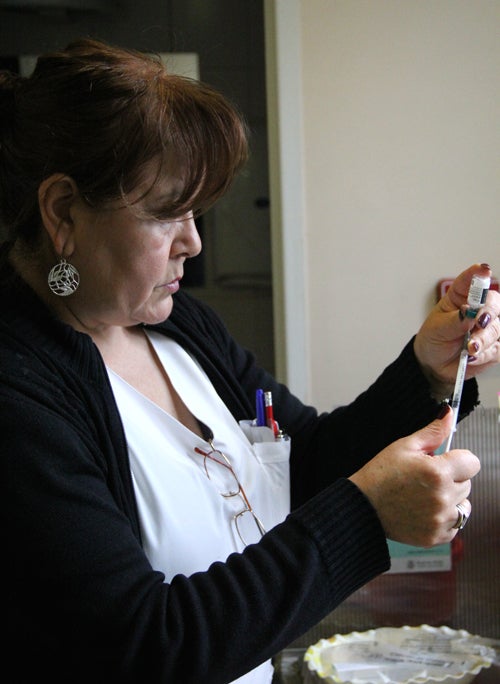Single-dose vaccination strategy for infants dramatically reduces cases and has eradicated the need for transplants due to acute liver failure in children
Buenos Aires, 1 August 2018 (PAHO/WHO) - "Do you know why vaccinations are so important," asked the nurse as she flicked through baby Valentino's vaccination record. "To protect my child," said Candela. "Yes," answered the nurse at the Pedro de Elizalde Children's Hospital in Buenos Aires, "but to also help protect everyone else."
The chat happens just before 1-year old Valentino is due to receive his vaccine against hepatitis A as part of an initiative that was incorporated into Argentina's National Vaccination Program, one that has dramatically reduced the number of cases of hepatitis A and eradicated the need for transplants due to acute liver failure in children.
Argentina was the first country in the Americas to use a single dose vaccine against hepatitis A in 1-year old children, an innovative decision praised by the World Health Organization (WHO) thanks to results that are still being seen 13 years after it was included in the Program. "Between 2003 and 2004, we experienced an outbreak of the virus with more than 43,000 cases," said Cristian Biscayart, Head of the Argentine Ministry of Health's Vaccination Program. "Following the introduction of the vaccine in 2005, however, the viral circulation has decreased dramatically in the country. Today we have less than a thousand cases per year, including both children and adults," he added.
The decision was innovative because, until the introduction of the single-dose vaccine, countries used a two-dose scheme. "Argentina did not have the funds to finance both doses so it decided to incorporate a single-dose vaccine in order to deal with the outbreak, and to reduce the high number of liver transplants in children, caused by the disease," recalled Margarita Ramonet, pediatric hepatologist and former president of the Argentine Society of Pediatrics (SAP).
"The implementation of a single-dose program really surprised us but we agreed with the Ministry that we would monitor results in order to verify its effectiveness," said Ramonet. The monitoring revealed unprecedented results: The number of cases of hepatitis A had fallen by 88% and the virus had ceased to be the leading cause of acute liver failure-related transplants in the country's children.
Thanks to this program, our results are now back in line with international figures and organs can be given to those patients who really need them and not to patients with a preventable disease that never should have become so serious.
In 2012, the results were presented to the WHO Strategic Advisory Group of Experts on Immunization (SAGE), which published a position paper recommending the inclusion of this single-dose vaccine into national immunization programs for children age 1-years old, a decision which inspired countries such as Colombia and Brazil to follow suit and implement the strategy.
No transplants mean bigger savings
The measure also led to huge changes for pediatric hospitals. This was certainly the case for the Garrahan Hospital, the country's main children's hospital. "Prior to the implementation of the single-dose vaccine, we saw that the number of more severe cases was growing. In 2004, for example, there were 25 patients with acute hepatitis A and the majority of these required transplants," said Oscar Imventarza Head of the Liver Transplant Service at Garrahan Hospital. "That's when we began to discuss possible solutions with the government and decided to implement the single-dose vaccine program. Following its implementation, cases of acute hepatitis A requiring of a transplant completely disappeared in children," he added.
"Thanks to this program, our results are now back in line with international figures and organs can be given to those patients who really need them and not to patients with a preventable disease that never should have become so serious," said Imventarza. The vaccine is acquired by Argentina using the Pan American Health Organization's (PAHO) Revolving Fund, a mechanism that helps countries buy doses at much lower prices.
"Beyond the benefits to public health, there has also been a significant economic impact," said Ramonet from SAP. "The reduction in cases and the elimination of transplants has led to important savings for the health system." According to a report on the impact of the single-dose immunization strategy against hepatitis A in Argentina, published by the European Society of Pediatric Infectious Diseases' Pediatric Journal of Infectious Diseases, just one liver transplant costs around 40,000 dollars.
Increasing coverage
Both doctors and officials admit that vaccination coverage among the population is "not ideal", not only when it comes to hepatitis A, but also regarding other vaccines covered by the country's vaccination program. In order to tackle this issue, experts from PAHO and the Americas region met recently in Buenos Aires to analyze a new regional strategy to increase coverage in large cities.
"In the case of hepatitis A, good vaccination coverage prevented outbreaks and stopped transmission of the virus so it is vital that high vaccination levels are maintained," said Biscayart, Head of Argentina's Vaccination Program, which provides 19 vaccinations, free of charge in the country's health centers.
At the regional Level, in addition to Argentina, a further 9 countries vaccinate against hepatitis A (Brazil, Canada, Colombia, Chile, United States, Mexico, Panama, Paraguay and Uruguay). Some of these countries routinely vaccinate children and others just focus on at-risk groups, depending on the level of infection in their particular territories. PAHO encourages countries to conduct epidemiological and cost-effectiveness studies to determine the possible implementation of the hepatitis A vaccine, based on public health priorities.
In health centers across the country, where hundreds of health professionals explain to parents, like Candela, the importance of vaccination, immunization as an act of love that protects, prevents disease and saves is proven time and time again.
Related Link



